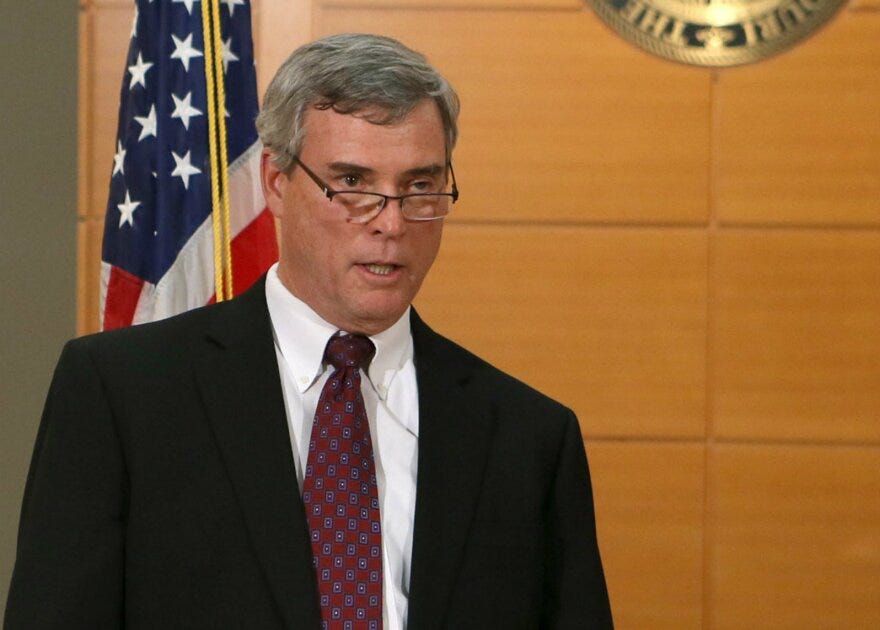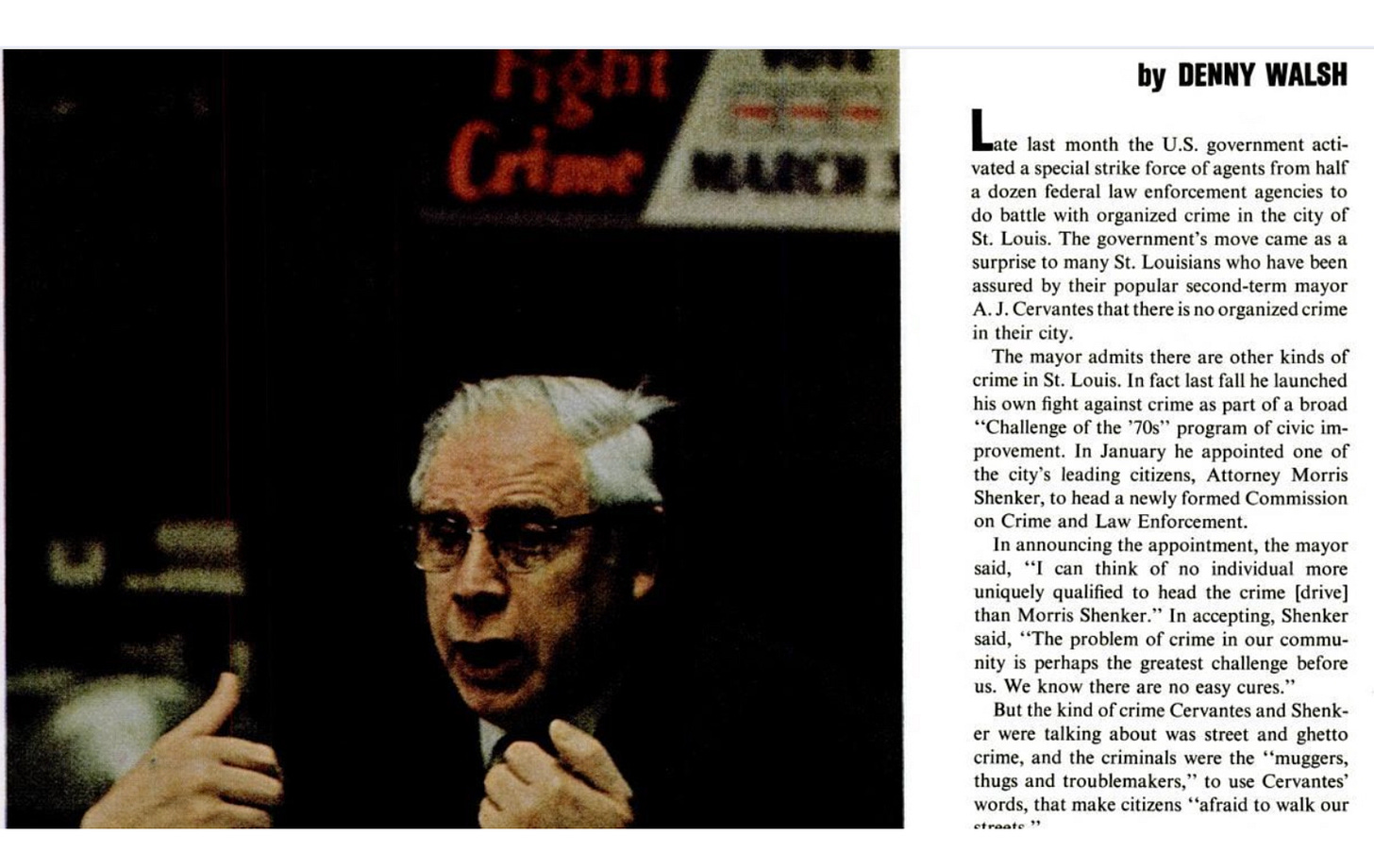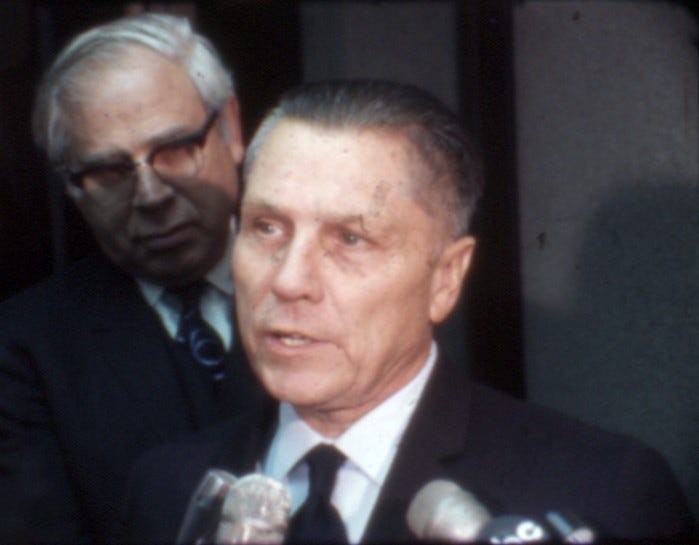Covering for the Ferguson Op
How a long-time prosecutor was key to making sure the hostile foreign intelligence-assisted autocracy stress test never got properly investigated.

Today, we continue our exploration of counterintelligence and political warfare in St. Louis. There is much to unpack about the Ferguson Op, which was a key to the birth of the chaotic Trump era. In our last episode, we discussed that Ferguson was planned, blessed by local elites either passively or actively, and protected by complicit local technocrats. The larger counterintelligence threats would never have been possible without this local help.
Today’s episode is the story of just one of those technocrats: Former St. Louis County Prosecuting Attorney Bob McCulloch, who convened a grand jury to prosecute Officer Darren Wilson for homicide, when at the very least it was unlikely he was going to try too hard for success. The anomalous grand jury failed to return an indictment, and the media narrative ran wild such that: Wilson was exonerated instead of merely not charged with a crime, and thus all the violence to come was supposedly from a wild citizenry that somehow perhaps deserved to have military materiel deployed against them on U.S. soil. This narrative was malign, and part of a larger influence campaign to justify increasingly violent, extrajudicial treatment of American citizens by local authorities.
The story of that influence campaign still needs to be explored without fear or favor. It starts with revisiting the killing of Michael Brown and the lack of accountability that ensued.
Police insider in a city owned by organized crime
Robert P. McCulloch, born 1951, was Prosecuting Attorney in St. Louis County from 1991 to 2018, just shy of three decades. McCulloch’s father was a police officer killed in the line of duty in North St. Louis City’s notorious Pruitt-Igoe projects in 1963. Multiple generations of his family serve as police officers.
McCulloch’s rise to chief prosecutor in a county of one million residents by age 40 happened in a city controlled by the Italian mafia under the watchful eye of the Chicago rackets. St. Louis and Kansas City had been the first two main hubs on the Chicago Outfit’s trafficking routes since Prohibition, and heavily connected to its main operations in Las Vegas. Money went back east from Vegas through St. Louis, something that law enforcement insiders of any seniority most likely know.
The Las Vegas-St. Louis connection is under-celebrated and certainly under-discussed. Of course, The Dunes hotel in Las Vegas had been purchased by St. Louis attorney Morris Shenker—Russian immigrant, consigliere to Jimmy Hoffa, and much more—using union pension funds. (The Dunes was bought from Shenker in 1992 by Macau casino magnate/GOP financier/FARA agent of China Steve Wynn, so you know this story will stay very interesting.)
Shenker was a man of many talents, and an interesting character who arrived in the United States without a command of the English language but who still put himself through the elite Washington University in St. Louis Law School. Shenker sometimes collaborated in joint defense arrangements with local attorneys, such as criminal defense Grand Poobah Ray Bruntrager. In 1963, Shenker also famously raised money for the state of Israel out of the St. Louis rackets I mean because he’s a community philanthropist, even getting an official ass-kissing from President John F. Kennedy and Vice President Lyndon Baines Johnson themselves.
Shenker almost partnered with Frank Sinatra on the Vegas casino business, but Frank was on the outs with the Nevada Gaming Commission, reportedly due to all of that acrimony between Sam Giancana and the Kennedys.
This makes Shenker’s appointment to lead a crime commission by former St. Louis Mayor Alfonso Cervantes darkly hilarious, wouldn’t you say?

Now, you may think this article has gone off the rails, since it’s supposed to be about this milquetoasty-looking Bob McCulloch character from “Ferguson.” Ah, but then you would be falling for a certain St. Louis sleight-of-hand: the conceit that organized crime is somehow in the past, or that it no longer forms the current power structure of the city. Not only would the conclusion that “Ferguson” was divorced from organized crime be wrong, it would ignore all the glaring connections visible to the naked eye.
For example, Shenker’s collaborator Ray Bruntrager was the father of Neil Bruntrager, who runs the St. Louis Police Officers Association and served as Officer Darren Wilson’s defense attorney in McCulloch’s highly-suspect grand jury. Neil also represents the Taxi Commission, the Palestinian drug trafficker who was just caught bribing the local St. Louis government, and many other colorful sorts. St. Louis can feel small, but it’s around two million people, and there are more than five attorneys living here, so let’s go ahead and call that more than a mere coincidence.
Fact is, McCulloch insisted on prosecuting Officer Darren Wilson himself, even though he was considered by DOJ to be too personally invested in the matter, and also since the other four times he convened grand juries against police officers he was always strangely incapable of securing an indictment.
In late 2014, McCulloch convened a grand jury on the officer-involved shooting of Michael Brown, and it failed to indict. (DOJ’s wrap up of whether there was enough evidence to prosecute Officer Wilson on 18 U.S. Code § 242 charges can be read here.)
McCulloch decided to hold a press conference announcing the results of his “unsuccessful” grand jury in the dark of night on November 24, 2014 at 8:15 p.m. in downtown Clayton, Missouri, allowing the cinematic cameras to capture the flames of “protest” with excellent color contrast and vivid dramatic flair. Michael Brown’s stepfather then suggested that people “burn this bitch down,” which then provided the proper lighting for the footage to come.
The popular narrative is that Ferguson was emblematic of American racism, and it was surely that. But the undercurrents of organized crime have never been properly examined. I continue to submit that it is the public corruption in St. Louis, even more than its racism, that made this city the ideal set for a hardcore autocracy porn film.
Subscribe! We have yet to discuss the Espionage-a-palooza that exploded around Ferguson in 2014! And we really should. Don’t miss it!





